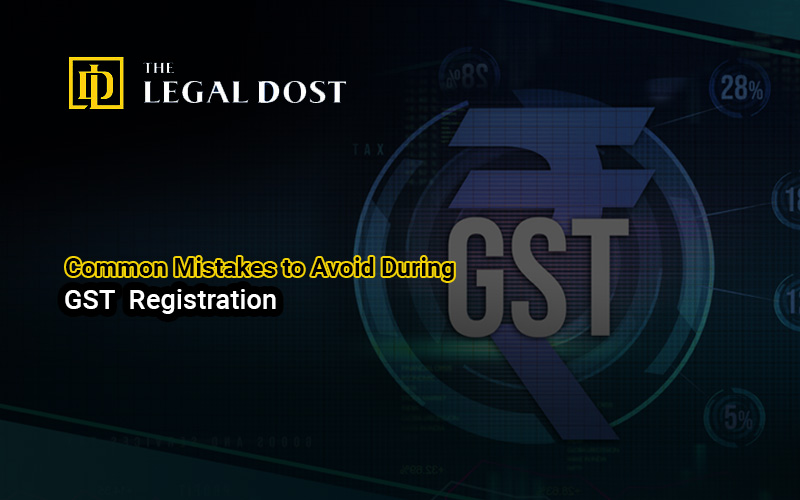The Goods and Services Tax (GST) represents a significant overhaul in India’s taxation framework, designed to establish a unified market across the country. For businesses in India, obtaining GST registration is essential for ensuring compliance and seamless operations. Errors frequently disrupt the relatively straightforward process, causing delays, penalties, and operational disruptions. This blog delves into the common pitfalls businesses should steer clear of during GST registration:
Incorrect or Incomplete Documentation
One of the most frequent errors during GST registration is providing incorrect or incomplete documentation. The GST portal mandates specific documents to confirm the business’s existence, identity, and address. Commonly required documents include:
- The PAN card belongs to the business or applicant.
- Proof of business registration or incorporation certificate
- Identity and address proof of promoters or directors with photographs
- Address proof of the businessplace
- Bank account statement/cancelled cheque
- Digital Signature Certificate (DSC) for companies as well as LLPs
Choosing Incorrect Business Category
Choosing the correct business category during GST registration is essential. The GST categories include Regular Taxpayer, Casual Taxable Person, Composition Scheme, and Non-Resident Taxable Person, among others. Each category comes with its own set of compliance requirements and tax rates.
Misclassifying Goods and Services
Precisely classifying goods and services is crucial for determining the appropriate GST rates. It is important to correctly use the Harmonized System of Nomenclature (HSN) codes for goods and the Services Accounting Code (SAC) for services.
Providing Incorrect Bank Details
The bank details submitted during GST registration must be accurate and align with the business’s financial records. Any discrepancies or incorrect bank information may lead to the rejection of the application or create issues with future transactions.
Ignoring State-Specific Requirements
Although GST is a unified tax system, state-specific requirements can differ, particularly regarding local taxes and regulations. Overlooking these variations can result in non-compliance and penalties.
Not Verifying Email and Mobile Number
An OTP is sent to the registered email address and phone number during the GST registration process to make sure they are genuine. Contact information that is wrong or not confirmed can stop the registration process.
Inaccurate Address Details
Ensuring accuracy in stating the primary and secondary business locations is crucial, as they need to align with the provided address proofs. Any discrepancies in the address information may lead to non-compliance and potential legal ramifications.
Failing to Keep Track of Amendments
The landscape of GST laws and procedures is continuously evolving, with regular changes and updates. Neglecting to keep updated on these amendments can result in outdated practices and non-compliance.
Ignoring Professional Help
Many businesses attempt to handle GST registration without professional help, leading to errors and delays. Despite the user-friendly design of the process, those unfamiliar with tax laws may find the nuances challenging.
Procrastination
Waiting too long to register for GST can lead to missed deadlines, operational delays, and potential fines. Businesses that fail to register for GST by the deadline risk fines or legal action.
Summary
Businesses that want to do business in India need to register for GST. If you don’t make these usual mistakes, the registration process will go more smoothly and successfully. To get through the complicated process of GST registration, you need to stay informed, organized, and attentive. Businesses can stay in compliance and focus on growth and success by following the latest rules and getting help from professionals when they need it.
FAQ's
The following documents are essential for GST registration:
- The PAN card belongs to the business or the applicant.
- Proof of business registration or incorporation certificate.
- Photographs of promoters or directors serve as proof of identity and address.
- Address proof of the business place.
- Bank account statement or cancelled cheque.
- Companies and LLPs can obtain the Digital Signature Certificate (DSC).
It is critical to choose the correct business category, such as Regular Taxpayer, Casual Taxable Person, Composition Scheme, or Non-Resident Taxable Person. Each category has specific compliance requirements and tax rates. Talking to a tax expert can help you make sure you pick the right category for your business.
When you use the Harmonized System of Nomenclature (HSN) codes for goods and the Services Accounting Code (SAC) codes for services, you can figure out the right GST rates. Misclassification can lead to incorrect tax calculations and fines.
If the bank details change, you need to make the change in the GST portal so that your records are still correct. Incorrect bank details can cause applications to be turned down and transactions to go wrong.
Yes, even though GST is a unified tax system, each state may have its own rules and standards. It’s important to know these state-specific rules and follow them to avoid penalties for not following them.
An OTP has been sent to both your email address and mobile number to make sure you are who you say you are. If these facts aren’t checked, the registration process can be stopped.
Yes, getting help from a professional is a good idea because it can help you avoid mistakes and delays. Professional tax experts are familiar with all of the GST rules and can assist you greatly during the registration process.


